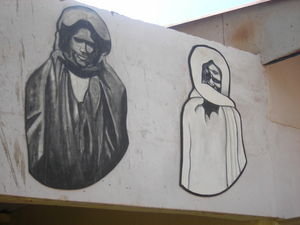Advertisement
Published: September 20th 2007

 religious cardboard cutouts on the outside of my house
religious cardboard cutouts on the outside of my house
The man in the white is Cheikh Amadou Bamba, founder of the Mouride brotherhood. The man in the black is his most famous followers, Cheikh Ibrahima FallWell, Ramadan is in full (rather boring) swing. I feel like I've pretty much gotten used to living in a Muslim country, and I must say, it is much different than I ever would have thought.
When most Americans think of an Islamic nation, many think of the rather fundamentalist countries, like Saudia Arabia or Iraq. The atmosphere here in Senegal is
so different. Women are not required to wear veils (though some do choose to), and you certainly will never see anyone wearing a burqa (the full veil covering everything but a woman's eyes). The main regulation as far as clothing goes is that your knees should be covered, but tube tops, spaghetti straps, and halter tops are all perfectly okay (weird, huh?) The men can wear whatever they want, as dressing modestly doesn't seem to be an issue for them.
There aren't mosques everywhere like there seem to be churches on every corner in the US. There is usually one mosque per neighborhood. Unfortunately, I live very close to the mosque in Mermoz, and am therefore subjected to the call to prayer (always starting out with "Allah akbar"...or God is great) at least four out of the

 posters inside my house
posters inside my house
these are posters of important members of the Mouride brotherhoodfive times a day (5am, 2pm, 5pm, 7pm/sunset, and 8:30pm). Life seems to revolve around these prayers; for example, during non-Ramadan times, we eat lunch just after the afternoon prayer, and dinner is always after the last prayer of the evening. You often see taxi drivers pull over to the side of the road or men working in corner boutiques closing the door and pulling out their prayer rugs at 5pm. Right now, the 5am call to prayer also means breakfast time for those fasting, as they have to eat before the sun rises. The fast is now broken after the prayer at sunset.
Islam is everywhere, but it isn't a threatening feeling. For a country that is 95% Muslim, they are surprisingly tolerant of non-Muslims. Christians and Muslims co-exist peacefully - though Muslims have some issues with Christian beliefs, they don't persecute or target them in anyway. I have had some interesting conversations, though, with Muslims. They are very upfront about the fact that they believe that Christians and Jews have it all wrong - they belive in the right God, but since they don't believe in the right Prophet, they've obviously chosen the wrong path. It was
very weird for men to talk to one guy who was like "I know Christians believe that...oh, what's his name?....is the right prophet, but it wasn't him. They were a few centuries too early." As someone from a country with a lot of Christians, I guess I just assumed everyone knew Jesus' name. Guess not! (Side note: maybe it's not Bachir's fault...in Arabic, Jesus is called "Issau")
A very interesting aspect of Islam in Senegal is the idea of
confrèries (French for "brotherhoods"). The brotherhoods here are a very characteristic aspect, and they are incredibly powerful (they have influence over how their members vote, can get jobs for their members when the job market is practically non-existent...they even make decisions different from Mecca, the capital of Islam...and the followers all choose to believe the brotherhoods!) My family belongs to the Mouride brotherhood, which is centered in Touba, Senegal (my History of Islam class is taking a field trip, and I am so excited!), and people take pilgrimages to this city if they cannot afford to travel to Saudi Arabia. Basically, the Mouride followers choose a
cheikh (religious leader) and they swear complete obedience to him. Instead of giving alms
to the poor, they give alms to the cheikh and trust that he does with the money as he sees fit. They believe that cheikhs have
baraka (or, a mysterious power) that allows them to send people to heaven. Therefore, eating food left behind by a cheikh, touching his clothing, or even getting his saliva on your skin is considered very good in improving your chances of getting to paradise in the end. Personally, I think it sounds like idolizing a living person (which is against the Muslim faith), but it is a very widely accepted practice here.
The Mouride brotherhood allowed the Wolof (the predominate ethnic group here in Senegal) to keep their caste system after the colonial French government redid the ruling system. It kept the hierarchy (with cheikhs being superior to, wealthier than the followers, etc), and kept things sort of how they had been for centuries. The brotherhood also allowed believers to keep many of their traditional, animist beliefs (which means they attribute spiritual powers to various things, like animals, etc...sort of along the same lines as Native American beliefs).
You can easily see evidence of these traditional beliefs in my family. All of
the young boys wear
gris-gris (amulets) around their waists. These amulets are verses from the Qur'an written on slips of papers, placed inside a charm, and worn around the waist, upper arm, etc. and they're believed to protect to wearer from harm. If a non-believer (aka, me) touches or asks about the gris-gris, its power is lost and a new one must be obtained. The belief in these amulets are so strong here that when a man is sent to prison, they take away his gris-gris and destroy it because the guards believe it has to power to make him invisible or invincible to their attempts to stop him from escaping from jail.
There is also the belief in evil spirits, known as
jinnes. These bad spirits can take away loved ones or possessions if the appropriate verbals cue as said outloud. It is therefore entirely inappropriate to say how cute a baby is or how big a child is getting because the family believes that if a spirit hears these praises, he will do something evil (like kill the baby, or make the child sick) to sort of even the score. The Senegalese also tend to avoid numbers or giving away locations of family members. My first day with my family, I asked how many people lived in the house. My uncle responded "It's a family house, we all live together." This way, he avoided saying "twelve" and therefore the spirits could not reduce the number of inhabitants. Also, if we ever ask where someone is, the response is either "Il n'est pas ici" (he's not here) or "il est parti" (he went out). It gets so frustrating because I
know he's not here, hence the reason for my question, but they believe that by giving away the loved one's location, the jinne can find him or her.
There are also groups here in the Dakar area that believe that a certain type of evil spirit, a
rab, can possess someone and make them seriously ill (cause schizophrenia, for example). Therefore, twice a month, the village of Yoff holds exorcisms, known as
ndeup. These last for several days, include music, dancing, sacrifices of animals, etc. The whole village gets involved, and the family of the afflicted pays the equivalent of years worth of salaries. I am really interesting in attending one of these ceremonies (outsiders are permitted to watch), but apparently it is quite disturbing for foreigners.
If you made it to the end of my long ramblings about Islam in Senegal, you're probably thinking how bizarre it all is. What's even more bizarre, though, is how it all seems to work together. At first I was a bit confused and skeptical about all of the intertwined beliefs, both Islamic and traditional, but you'd be surprised at how quickly it becomes the status quo. I am no longer curious about the leather strips tied around waists at the beach, and I realize that I will probably never know where my 3-year-old brother is now, even after he comes back. And that 5am call to prayer? It's turned into little more than a reminder that I still have two and a half hours left to sleep. 😊
Namm naa leen!! ("I miss you all" in Wolof)
Advertisement
Tot: 0.072s; Tpl: 0.013s; cc: 7; qc: 29; dbt: 0.0264s; 1; m:domysql w:travelblog (10.17.0.13); sld: 1;
; mem: 1.1mb









Katie
non-member comment
That's so crazy. You should teach them some of our superstitions (pinch of salt, and ladders, and all that jazz) just to entertain the kids. :) And that is rather funny that they didn't know Jesus's name. Certainly made my night. And I wonder where your little brother went... Mischief-making perhaps?